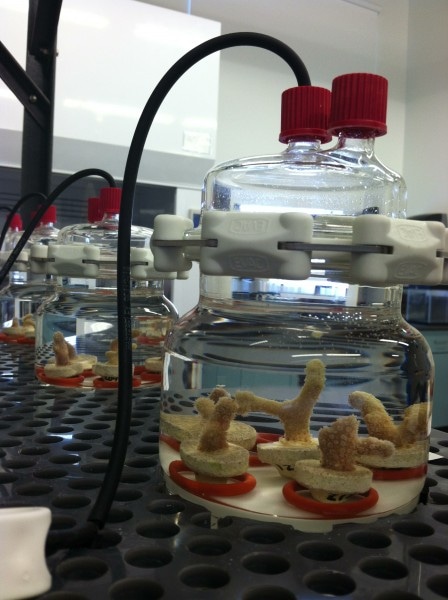Aug 8 2016
Despite names that are easily recognizable – Exxon Valdez, Deepwater Horizon – the records show that the number and volume of oil spills has been declining for years.
 Corals in Hydrocarbon Research. (Credit: Abigail Renegar, Ph.D., NSU)
Corals in Hydrocarbon Research. (Credit: Abigail Renegar, Ph.D., NSU)
Nonetheless, there is a large number of oil spill preparedness and response professionals in government and the oil and response industries that are responsible for protecting the environment in the event of a spill.
In a marine oil spill, a high priority for responders is the protection of corals and coral reefs, which, for a myriad of other reasons, are under stress throughout the world. To accomplish this, responders need the best possible scientific information on the effects oil has on corals. To that end, researchers at Nova Southeastern University's (NSU) Halmos College of Natural Sciences and Oceanography have been studying the effect hydrocarbons have on these unique marine creatures.
The challenge: no one really knows, at what levels, which hydrocarbons kill off corals. What people may not realize is that there is natural oil "seepage" from the ocean floor. And given those can be near coral reefs, there is a certain level of "tolerance" that corals may have to exposure at that level. It's when massive amounts of oil is suddenly dropped onto a reef that is the concern – how do they handle that and how much is too much for corals to deal with.
To determine at what levels corals are adversely affected, and to ultimately assist response decision-makers in choosing response tools, such as dispersants, researchers have been studying various hydrocarbons at different concentrations to create a "baseline" of data that can then be used worldwide when responding to the next oil spill. The research is designed to provide new information on the sensitivity of shallow-water corals to oil and dispersed oil, linking field studies with controlled laboratory experiments that examine a range of possible hydrocarbon exposures.
"Coral reefs typically exist in coastal environments, often near areas of dense human population, which provides the opportunity for negative impacts like oil spills to occur," said Abigail Renegar, Ph.D., a principal investigator in the new NSU research. "What we find is that the data are limited and there are few reports from past oil spills that refer specifically to corals – previous research tends to be general and sometimes contradictory."
So Dr. Renegar and her colleagues at NSU and Texas A&M University set about to create a study that would provide consistency when it came to how hydrocarbons impact corals. The results of the first part of the study have been published in Environmental Toxicology and Chemistry (June 2016).
The research team is made up of Dr. Renegar, Nicholas Turner, Bernhard Riegl, Ph.D. and Richard Dodge, Ph.D. from NSU; Anthony Knap, Ph.D. from Texas A&M University; and Paul Schuler, from Clean Caribbean and Americas, who is funding this study. Additionally, more than 15 collaborators from government and industry, including the National Oceanic and Atmospheric Administration (NOAA), and several oil companies are participating in the study.
According to Dr. Renegar, the team is working to develop a standardized toxicity testing protocol for adult corals, which could then be applicable to other coral species. The study has generated new hydrocarbon toxicity data for shallow-water corals, showing significant lethal and sub-lethal impacts of the hydrocarbon 1-methyInaphthalene. Now, she said, further experimentation with this testing protocol and other hydrocarbons using the current coral species and others will contribute to a more complete picture of toxicity to scleractinian corals.
While that all sounds pretty technical and very scientific, Dr. Renegar said there's an easy way to understand why they are studying what they are studying.
"The goal is to understand how corals respond to various hydrocarbons and then share the data with those in decision-making positions should another oil spill occur near coral reefs," she said. "An improved understanding of how corals are impacted can help us make better decisions on how to deal with the next oil spill. The information derived from the study is already being integrated into NOAA's toxicity models and is expanding the body of knowledge on the subject."